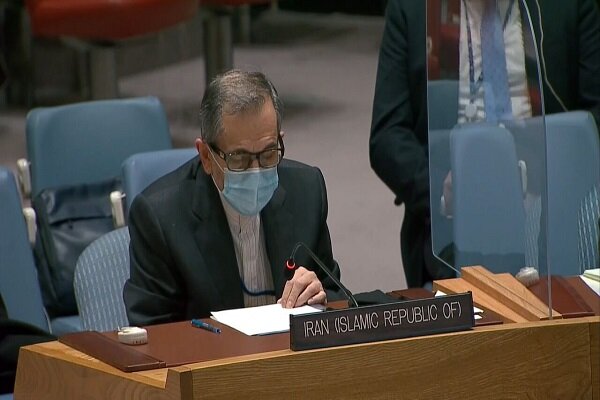Iran backs OIC ampaign to counter Islamophobia

TEHRAN – Iran’s ambassador to the United Nations has voiced Tehran’s support for efforts by the Organization of Islamic Cooperation (OIC) to fight Islamophobia.
Majid Takht Ravanchi made the remarks after the UN General Assembly on Tuesday voted in favor of a resolution naming March 15 as International Day to Combat Islamophobia.
Iran led the talks that culminated in the development alongside Pakistan, Turkey, Saudi Arabia, Jordan, and Indonesia, Tasnim reported.
Iran’s ambassador to the UN says, “It is critical for the UN to unite against abhorrent use of ignorant terms such as ‘Islamic terrorism’.”
In a general statement after the adoption of the draft resolution, Takht Ravanchi said, "The growing trend of intolerance and prejudice against Islam and Muslims worldwide poses a daunting challenge. Over the last few decades, harmful stereotypes and prejudices regarding Muslims and Islam have been chronically reinforced by mainstream media, senior politicians, influencers of popular culture and within academic discourse. Simultaneously, numerous discriminatory practices have been implemented in various parts of the world, including restricting Muslims from living according to their belief system, securitization of religious communities, restricting access to citizenship, socioeconomic exclusion and pervasive stigmatization of Muslim communities.”
The ambassador said UN members are tasked to fight “discrimination, racism and xenophobia” and called on the international community to strongly fight against hate speech against Islam.
“We, as responsible members of the United Nations, bear a heavy burden in fighting discrimination, racism and xenophobia. We need to strongly condemn hate speech and acts of hate against Muslims while taking the necessary measures to prevent this violation of basic human rights of Muslims. It is critical for the United Nations to unite against attempts at embracing Islamophobia, including through such measures as the Muslim travel ban, banning Muslim symbols and the abhorrent use of such ignorant terms as ‘Islamic terrorism’. It is our firm conviction that terrorism, in all its forms and manifestations, cannot and should not be associated with any religion, nationality, civilization or ethnic group,” Takht Ravanchi added.
The ambassador said the world can gain a better understanding of Islam by observing the resolution by UN General Assembly in naming a day to combat Islamophobia.
“The Islamic Republic of Iran affirms its full support for OIC initiatives to combat Islamophobia, in particular the designation of the 15th of March as an International Day to Combat Islamophobia by the UN General Assembly. Through the observance of this day, we can build a better global understanding of Islam and Islamic precepts and convey, through the General Assembly, a message of international solidarity and cooperation,” stated Iran’s top ambassador to the UN.
“In this regard, we welcome the adoption by consensus of the draft resolution today by General Assembly. This resolution demonstrates our determination to effectively and constructively address Islamophobia as one of the main challenges faced by the international community. We urge all Member States to shoulder their responsibilities and live up to their legal obligations in order to advance the shared values of peaceful co-existence, tolerance and mutual understanding. Let us keep striving for justice, dignity and inclusion. For our Muslim brothers and sisters -and for all humanity,” he concluded.
Pakistan plans to host the 48th session of the OIC Council of Foreign Ministers on March 22-23 to discuss topics on Islamophobia, Afghanistan, Kashmir and Palestine, according to Pakistan's ambassador to Turkiye.
Muhammad Syrus Sajjad Qazi told Anadolu Agency in an interview that this year's session also coincides with Pakistan Day parade, where the OIC foreign ministers will be guests at the event as well.
"In 1940, the All-India Muslim League met in Lahore and decided that the Muslims of South Asia deserved and wanted an independent homeland of their own. Seven years later on Aug. 14, 1947, Pakistan came into being as a result of the resolutions adopted in 1940 on March 23," Qazi said.
Regarding the meeting's agenda, Qazi said it will encompass everything that is of interest to the Muslim world, with this year's theme "Partnership for unity, justice and development.”
"But specifically, Palestine will be discussed, Kashmir, and other important issues for our various member states. Islamophobia, the trend of hate speech against Muslims, negative stereotyping of Muslims, and the situation in Afghanistan and its humanitarian dimension will be discussed," he said.
